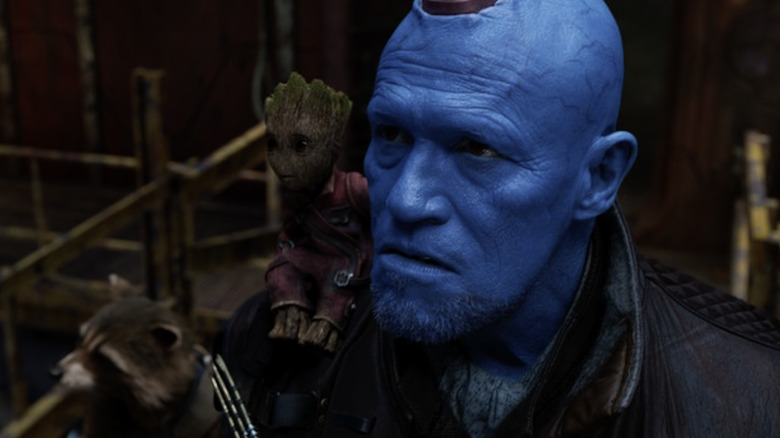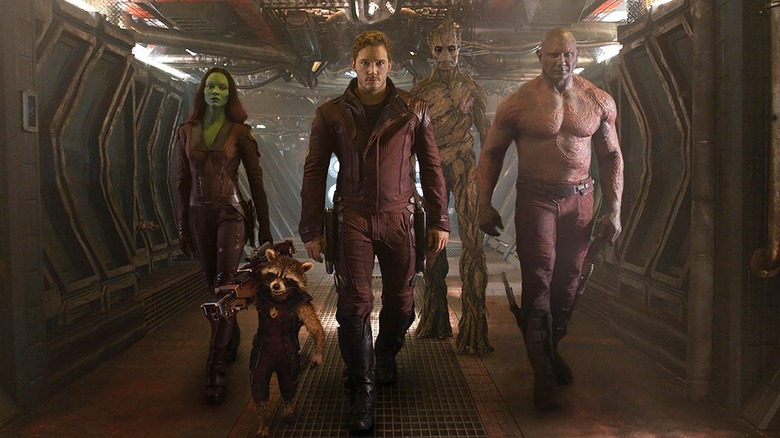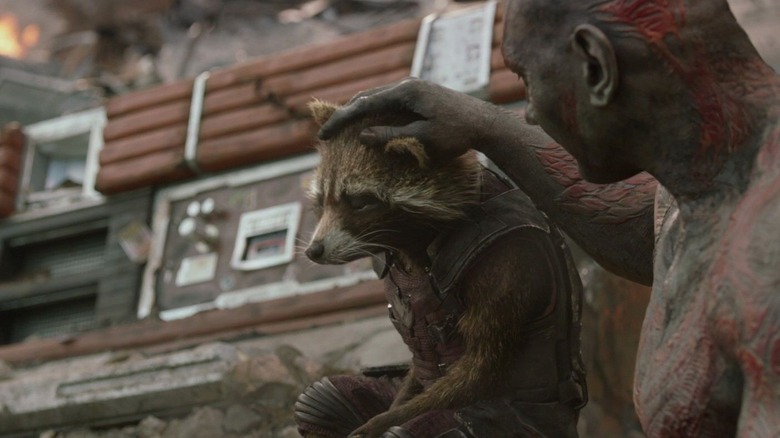Leaving The MCU, James Gunn Will Miss Kevin Feige's 'Wisdom And Friendship' The Most
Since 2014's "Guardians of the Galaxy" initially released in theaters, James Gunn has gone from an independent director freshly recruited to take part in the Marvel Cinematic Universe to one of the most important creative voices to watch for in the comic book film industry.
After his public firing/rehiring from "Guardians of the Galaxy Vol. 3" by Disney, Gunn wrote and directed "The Suicide Squad" for DC/Warner Bros., a successful collaboration that led to the spin-off "Peacemaker" series and ultimately resulted in Gunn's new role as the co-leader of DC Studios. Last year, Gunn and partner Peter Safran created a brand new project slate, shifting the creative direction of the entire universe moving forward. Most recently, Gunn confirmed himself as the writer/director of the upcoming "Superman: Legacy," which is currently on pause to support the current WGA strike.
This week, "Guardians of the Galaxy Vol. 3" finally releases in theaters, symbolizing a victory lap for Gunn's time in the MCU. In a recent interview with Collider, Gunn opened up about what he will miss the most as he creatively parts ways with the MCU, sharing nothing but glowing praise for his collaborators, producers Kevin Feige and Louis D'Esposito.
"Well, honestly, I'll really miss my friendship — not my friendship because I'm still friends, but I'll miss my relationship with Kevin [Feige] and Lou [D'Esposito] because I really like those guys, and they are incredibly helpful," Gunn explained. "You know, Kevin's not as — you know, he lets us kind of do our own thing more so than on the first movie where he was around a little more, but he made one really big change. He made one suggestion for 'Vol. 3' that was really helpful. And so I'll really miss that wisdom and the friendship."
Gunn's voice grew with the Guardians of the Galaxy trilogy
One of the main critiques of the MCU is that because of the high amount of production output and necessary connections between projects, there is a tendency to rely on stylistic homogenization, which in turn limits the creative freedom of the indie talent that are usually recruited to direct Marvel projects. Yet, Gunn's work on the "Guardians of the Galaxy" films don't exactly feel like they've been constrained in quite the same way.
Upon reflection on the "Guardians" trilogy as a whole, however, it might have to do with the fact that Gunn's voice on the trilogy was actually a more gradual progression. In comparison to the even bolder, colorful, and ambitious sequel "Guardians of the Galaxy Vol. 2," the original 2014 "Guardians" is much more humble. While it was still a great film and a bold risk for the MCU at the time, it plays it safe in other ways, with a more typical structure, an underwhelming villain (especially with Thanos out of the picture until "Avengers: Infinity War"), and broader emotional beats.
Gunn's assertion that Feige leaves a lot more room for freedom after the first one rings true in this regard; 2014 "Guardians" is a good first film, and it certainly has broader appeal, but "Vol. 2" is great, dialing everything up to eleven and feeling like a wonderful progression of Gunn's artistic vision, asking complex questions about redemption and morality that he continues to explore in his other efforts outside of the MCU. Crucially, that leveling up couldn't have happened without the guidance Gunn had making the first "Guardians," which was an extreme change of pace from the rest of his unconventional indie horror filmography.
'You got to know when to hold 'em, know when to fold 'em'
In an expensive, harsh industry full of corporate micromanagement and studio notes, Gunn has seemingly pulled off the impossible. His Marvel and DC efforts have pushed boundaries, highlighting niche characters and stretching the confines of the comic book movie genre, but Gunn's films are crucially very personal and tap into something sentimental and creatively singular — a rarity among his peers, including even auteur talent such as Chloé Zhao with "Eternals" and Sam Raimi with "Doctor Strange and the Multiverse of Madness."
Ultimately, Gunn pulls it off because he's just as much a Hollywood professional as much as he is a daring creative, which is a rare, difficult balance to achieve. In his Collider interview, Gunn compares the act of working within the film studio system to Kenny Rogers' "The Gambler":
"I really believe that the lyrics of Kenny Rogers' '[The] Gambler' have all the clues for being a filmmaker, which is, you got to know when to hold 'em, know when to fold 'em, know when to walk away and know when to run. And that is with every single thing that I do on the movie. You have to know when to fight and you need to know when to chill out and back down, and that has to do with other filmmakers, it has to do with actors, it has to do with producers, it has to do with studio heads. You have to know how to sort of ooze your way through things in a kind way."
Many of the criticisms audiences and critics have towards the MCU are certainly valid, but it's inspiring to see that sometimes a rare talent can still emerge and establish their unique voice despite such significant obstacles in their path.


